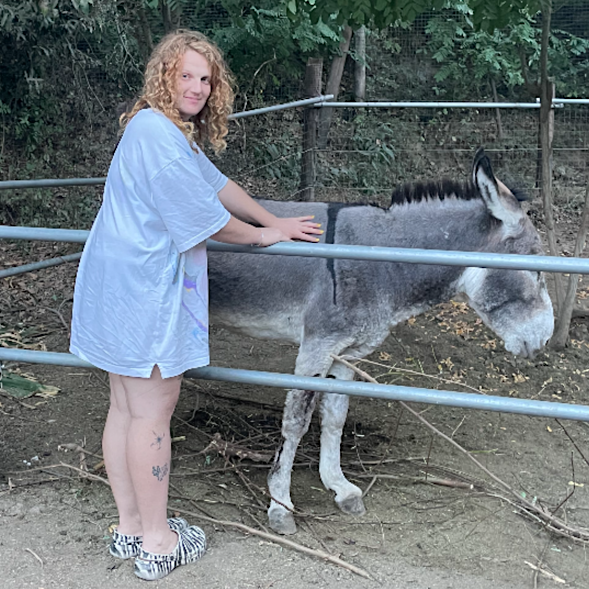
Adelita Husni-Bey describes Our Air—out today from Nightboat—as “Delphic, ecstatic, erotic, mystical, riotous, erudite.” I would only add the word hilarious. Nora Treatbaby is our lodestar in a strange, hellish landscape, leading us heavenwards to what she calls “a revolution which doesn’t feel available to us at the moment.”
This is a scream at the Apple Store; a love letter to the world; “all vibes.”
—Dante Silva
Dante Silva: I’m interested in all the possibilities, real and imagined, for life and matter. It seems you share this interest. Our Air is, in my reading, in conversation with science fictions, the more than human, concepts of future and futurity.
You write of a society “launching into / the end of itself.” If this is world’s end, how do we conjure other, more expansive forms of existence?
Nora Treatbaby: To be real, I don’t know. But I tend to roll my eyes at the idea that poetry’s worth is in what it imagines for us. I don’t want to imagine. I want to win. So politics, and ideally a revolution, which doesn’t feel available to us at the moment, would be how we have a more expansive existence. Although that existence might also be smaller but more beautiful. In the interim, we are left to do battle on the terrain we have, and write poetry to better understand that terrain, or at least enjoy it while in the act of reading.
Dante Silva: One reader said that she “lol-ed” at many lines in this collection. I liked that comment, and would agree for the line “who knew ‘twould / fuck so?” alone. What role does humor have in your poetic practice?
Nora Treatbaby: I am actually so much funnier in person. I have to constantly remind myself to make a joke once in a while in my poems. I feel like I talk about depressing things in my poetry and I would never want my art to be a burden on anyone. The reality is I’m probably trying to demonstrate the ridiculousness of our situation, not make light of it. I am capable of expansive, profound wisdom which is why I am drawn to poetry and I’m also a fucking idiot so I gotta include that.
Dante Silva: Rosie Stockton has described you as a “theologian.” While I read the collection I had a similar thought; these poems are almost mystical, a project in meaning-making. You write, “I am a line that receives heaven.” What does that mean to you?
Nora Treatbaby: It’s all vibes. I am not a theologian in the sense that I really try to do any of my philosophizing on the spiritual plane. That’s for communism (eventual heaven). I don’t really know answers except that I have this feeling that no matter how much the feeling of God wanes in this shit Earth it could not ever fully diminish and in fact replenishes in the most unexpected places. I am a line that receives heaven in the AT&T store.
Dante Silva: There are certain repeated lines that stuck with me, one of which was “You said the / vibrations of kinship w a stranger can change / you.” I love the thought of vibrations as communal, continuous, ceaseless change. This seems to be a thread in your work; I also loved the description of womanhood as an “insane vibration.” How do you work with subjects that are vast, vibratory?
Nora Treatbaby: I love vibes, I love vibrations. I am not a hippie but I am indebted to some of their ideas for sure. I think it’s how we describe the feeling we’re having as it exists outside of ourselves. Vibes being mad off at the Apple Store is just the feeling of fatigue that comes with being marketed to constantly. A woman being an insane vibration just felt more true to my experience than theories regarding the interchange of social production and perception. It’s just an externalization of some deep river in me.
Dante Silva: How did you choose the title, Our Air?
Nora Treatbaby: I got kind of obsessed with the word ‘our’ at the end of writing this book which is weird because it’s an ugly word and is hard to say for no reason. I guess I ultimately felt the book was naming what collectivity we do have whether unalienable or by choice in this situation that I find myself in (transgender woman in America). Like, I am inside of certain categories and I won’t deny that but I am also a part of something larger that transcends that. Also there is a line in a David Berman poem where he talks about beaming with pride when his elementary school teacher calls it “our sun” and I always loved that. So, you know, like all good ideas it was partly stolen.
